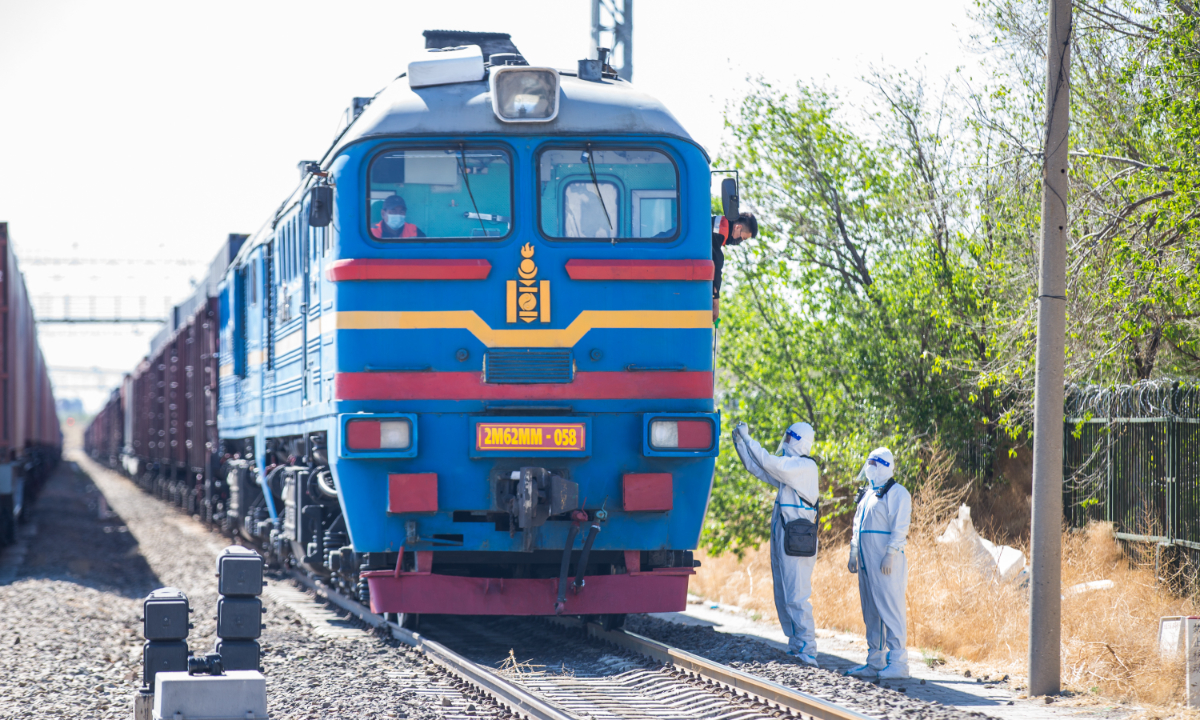China-Mongolia cooperation to be boosted by presidential visit: traders

The wide gauge cargo train dispatches from Erenhot, North China's Inner Mongolia Autonomous Region to Ulan Bator in Mongolia Photo: CFP
China-Mongolia trade ties will be further strengthened and expanded to a new level, as Mongolian President Ukhnaa Khurelsukh started a state visit to China on Sunday, during which bilateral cooperation in a wide range of areas is expected to be covered, Chinese traders and analysts said.
Trade of major goods such as coal from Mongolia and manufactured goods from China will continue to play an important role in bilateral trade, along with cooperation in infrastructure, particularly regarding the expansion of transport capacity and coverage, experts and traders said. Cooperation in areas such as agriculture and mining also have great potential under an improved transport system, they noted.
A cross-border import and export agent surnamed Li, who exports about 500 or 600 containers of goods to Mongolia and imports more than 1,000 containers from the country a year, sees even greater potential for bilateral trade.
"Compared with China-Russia trade, the volume and variety of trade between China and Mongolia are not high, with the Chinese side mostly exporting steel products, building materials and daily necessities to Mongolia and importing cashmere, wool and unpolished gems in return," Li said, adding that there is great room for trade growth and the visit is expected to boost bilateral trade.
From January to October, bilateral trade reached $9.67 billion, a year-on-year increase of 22.7 percent, data from the General Administration of Customs showed. Both imports and exports achieved double-digit growth, driven by the surging trade of Mongolian coal and Chinese commodity goods, despite high global inflation and the pandemic.
Political mutual trust between China and Mongolia have created favorable conditions for bilateral economic and trade cooperation, which will further be strengthened amid the high-level meetings during the visit, Da Zhigang, director of the Institute of Northeast Asian Studies at Heilongjiang Provincial Academy of Social Sciences, told the Global Times on Sunday.
"There are great prospects for cooperation in the fields of logistics, infrastructure, energy, agriculture and environmental protection… and both sides will explore the potential of further expanding practical cooperation and seeking the greatest common denominator within the framework of multilateral cooperation," Da said.
The joint development of railway networks with China has enabled Mongolia to buoy trade flows and China to stabilize its market supply of core goods like coal, which is the key area with potential, and the two sides will continue to look to unleash stronger momentum for trade flows, according to Da.
The Mongolian president's visit came just two days after the Zuunbayan-Khangi railway, which runs for 226.9 kilometers across southeastern Mongolia, started operations on Friday, after eight months of construction.
The line provides a vital connection between the Tavantolgoi-Zuunbayan railway and the Khangi-Mandal border crossing on the Mongolia-China border, according to the official website of the Mongolian government, laying the foundation for the opening of another new railway transportation channel between Mongolia and China, after a 233-kilometer cross-border rail line between the Tavan Tolgoi coal field and Gashuun Sukhait on the Chinese border was launched in September.
With the railway line going into operation, the annual import and export cargo capacity will increase by 20 million tons, while the total railway transportation volume will increase by 65 percent, people.cn reported. The distance to the international market will also be shortened by 242 kilometers, meaning major savings in transportation times and costs.
Discussions about stronger transport connections were on the agenda at the recent meeting between China's Minister of Transport Li Xiaopeng and his Mongolian counterpart via video link, during which the two sides discussed plans to enhance cooperation in highways, railways and civil aviation.
"It is hoped that the transportation departments of the two countries will further improve the level of transportation interconnections, ensure the safety, stability and smooth flow of the logistics supply chain, and take cooperation between China and Mongolia in transportation to a new level," Li said.
The railway connection between China and Mongolia is not only tapping into new opportunities between the two countries but the whole regional trade network, which enables Mongolia to have better links with other Asian markets, Da said.



